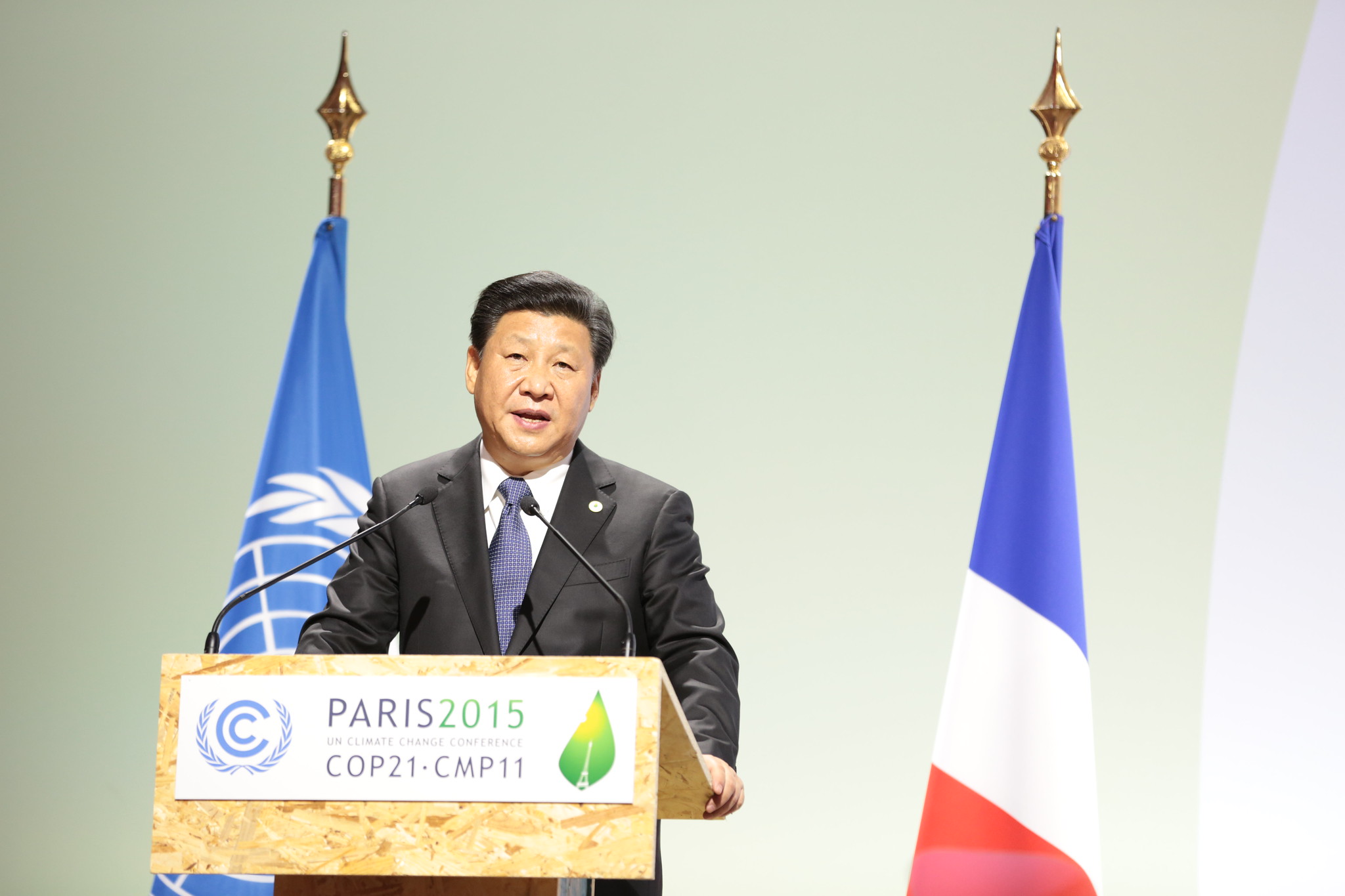China’s New Climate Pledge: Is Geopolitical Competition Good for the Climate?
Climate change is often thought of as an issue that can only be solved through an unprecedented amount of international cooperation. But geopolitical competition could be another path to a more sustainable future.

Published by The Lawfare Institute
in Cooperation With

For the second year in a row, Chinese leader Xi Jinping has issued a surprisingly ambitious new pledge to help tackle climate change. In September 2020, during the annual meeting of the U.N. General Assembly, Xi stunned most observers by committing China to slashing its carbon dioxide emissions to zero on a net basis by 2060—a commitment that was later expanded to include all greenhouse gas emissions, making it even more ambitious. This year, Xi used his General Assembly address to announce that China would cease building new coal-fired power plants overseas. Though important questions remain about its scope and applicability, the announcement represents a sharp break with Beijing’s long-standing enthusiasm for exporting fossil fuel infrastructure around the globe through the Belt and Road Initiative and other overseas investment initiatives. It also defies the conventional wisdom that, having made the Belt and Road one of his signature projects, Xi would be reluctant to limit its scope.
Given that China is both the world’s largest national source of greenhouse gas emissions and the biggest public financier of coal-fired power plants in other countries, the two commitments together promise to sharply reduce China’s contribution to climate change at home and abroad. But like most issues related to China and climate change, Xi’s latest September surprise holds geopolitical as well as ecological significance. While details around Beijing’s policy reversal on coal construction abroad are still emerging, it signals that progress on climate goals is still possible amidst a backdrop of growing geopolitical tension and competition with other major powers, most notably the United States. In fact, competition might even be good for the climate.
In the short term, the most significant implication of Xi’s coal phase-out will be to significantly strengthen Beijing’s hand ahead of the upcoming U.N. climate conference in Glasgow. Xi’s commitment to effectively decarbonize China’s economy by 2060 blunted foreign criticism of China’s long-standing refusal to commit to real cuts in its greenhouse gas emissions. The fact that Chinese firms and banks continued to build and finance coal-fired power plants overseas, though, became a new focal point of disapproval from the international community. U.S. and other foreign diplomats have repeatedly urged Beijing to phase out financing for coal overseas. In a May 2021 meeting, most of the world’s other major economies agreed to end financing for coal-fired power plants in third countries, and the European Union demanded, in uncharacteristically blunt terms, that such financing “must stop now”—a thinly veiled message to Beijing. Xi’s move to do just that will surely temper foreign criticism of the Belt and Road and other overseas development projects on sustainability grounds and, if fully implemented, will likely improve the image of China-backed projects in many recipient countries.
Moreover, when coupled with other initiatives included in his U.N. speech, including a new donation of 100 million COVID-19 vaccine doses to developing countries, Xi’s coal phase-out commitment also promises to significantly enhance China’s image and credibility on the world stage more broadly. Initial signs are that Xi’s policy announcement may produce commitments from Chinese financial institutions that are more ambitious than most of their counterparts abroad. While most other major economies have pledged to stop financing only from public sources, and only for coal, Chinese state-owned commercial banks have indicated that they view Xi’s announcement as binding on their own operations. Moreover, one of the country’s largest commercial banks, the Bank of China, suggested it might slash financing not just for coal projects, but to other high-emission industries as well while prioritizing renewable and clean technologies—a potentially industry-leading development in the growing field of green finance.
In the longer term, though, the biggest geopolitical takeaway is that real progress can be made on climate goals despite intensifying economic, military and ideological competition with other countries. Climate change is often thought of as a challenge that only unprecedented international cooperation, especially between the two largest national emitters, the U.S. and China, can address. Some commentators, including Democratic Sen. Bernie Sanders, extend this reasoning to argue that embracing geopolitical competition with China is dangerous in large part because it undermines the cooperation needed to tackle the world’s climate crisis. But the context of China’s twin climate commitments suggests that may not be entirely true. Mirroring broader trends in its foreign relations, China’s climate policy has evolved from one that emphasizes cooperation with foreign powers, especially the United States, to one increasingly centered on economic and geopolitical competition.
Diplomatic cooperation with China certainly played a critical role in moving international climate negotiations forward over the past two decades. Beijing was long suspicious of making firm commitments to reduce its contribution to climate change despite rapidly growing emissions, and scuppered a widely anticipated global deal during the 2009 U.N. climate summit in Copenhagen. This pattern was broken only after sustained diplomatic engagement by the United States, the European Union and other countries, culminating in the historic 2014 Joint Announcement on Climate Change by Xi and President Obama. The announcement, which jointly committed the United States and China to reduce their contributions to climate change as the world’s two largest emitters, helped break the long-standing deadlock between developed and developing countries on the need to reduce emissions and paved the way for the conclusion of the Paris Agreement in December 2015. The following year, the United States and China submitted their formal signed copies of the Paris Agreement on the same day—a powerful symbol of international climate cooperation.
Yet even as climate change became a shining example of Sino-American cooperation in response to shared global challenges, the broader relationship continued to worsen. Trade, the South China Sea, human rights and intellectual property theft all emerged as areas of deep tension and profound disagreement. Mutual trust withered further during the Trump administration amid the U.S.-China trade war, mutual recrimination over the spread of the coronavirus pandemic, and intensifying human rights abuses in Xinjiang, Hong Kong and elsewhere. In 2017, Washington formally labeled China a “strategic competitor.” And in the years since, a range of other powers, from the European Union to Australia, began to view China more warily, adopting greater restrictions on investment and other forms of exchange and interaction.
Along the way, climate change morphed from an example of cooperation into yet another arena of geopolitical competition, especially between the United States and China. The extensive subsidies doled out by Beijing to its renewable energy producers became a point of trade friction with Washington, as the U.S. government imposed tariffs that sharply reduced imports of Chinese solar panels. Since then, U.S.-designed Tesla electric vehicles have been banned from some military and other sensitive sites in China, ostensibly on security grounds, and Beijing threatened to ban the export of crucial wind turbine components, reportedly in retaliation for U.S. arms sales to Taiwan. Washington, for its part, subsequently restricted imports of polysilicon, an essential material in solar panels, in protest of human rights abuses in Xinjiang.
It is hardly surprising, given this background, that the United States and China have struggled to find common diplomatic ground on climate change despite the priority given to the issue by both sides. Biden and Xi have expressed the belief that climate change is an existential threat and a strategic priority. But senior Chinese officials, including Foreign Minister Wang Yi, have repeatedly linked closer cooperation on climate change with improvement in the overall U.S.-China relationship, suggesting that cooperation on climate change cannot be separated entirely from confrontation over human rights and other contentious issues. A joint statement released by the two sides in April 2021 called for cooperation on a range of climate-related issues, including reducing methane emissions. But in repeated high-level talks, Chinese negotiators reportedly rejected the most ambitious U.S. proposals.
In contrast, the extent to which other political and economic factors shape China’s climate policy is easier to discern. Xi has been clear that he views ambitious action on climate change as central both to his legacy as well as China’s standing abroad. Building on his predecessors’ belief that renewable energy, electric vehicles and other building blocks of the clean economy can help power China’s future growth, Xi carefully cultivated an image of personal commitment to the planet and of China as a responsible global power both willing and able to tackle daunting challenges like climate change. Over the past year, moreover, Chinese interlocutors increasingly emphasized their desire to make China’s overseas investments, including Belt and Road projects, more sustainable. Xi’s announcement lends credibility to these aspirations, and by extension helps to bolster China’s image both at home and abroad.
Within the U.S., meanwhile, some of the largest and most important investments in climate change mitigation and adaptation have been motivated by competition with China. In the years following Beijing’s entry into the world of international development with its sponsorship of the Asian Infrastructure Investment Bank and launch of the Belt and Road Initiative, Washington responded by creating an entirely new development agency, the Development Finance Corporation (DFC), and authorized it to loan up to $60 billion. This investment was justified in large part by the need to counter China’s influence across the developing world. But it also proved to be good for the planet, with DFC pledging to devote one-third of its investments to climate mitigation and adaptation. Moreover, some of the largest investments in federal clean technology research and development are contained in legislation that is primarily intended to help American business and researchers compete more effectively with China.
The fact that the world’s two largest emitters have made increasingly ambitious climate commitments despite greater geopolitical competition, and arguably even because of it, carries three important implications for the United States. First, and most immediately, Xi’s commitment to phase out support for new coal-fired power plants raises pressure on the U.S. and other major economies to go beyond coal and chart a path toward eliminating public financing for other emissions-intensive industries. Non-state entities can also play an important role: Harvard University’s recent decision to fully divest its endowment of fossil fuel investments provides a powerful example for other U.S. institutions to follow. U.S. policymakers should also devise ways to hold Xi to his word, highlighting cases where Chinese overseas investment produces ecologically and socially harmful effects and urging Beijing to work with host countries to make them more sustainable.
Second, and more fundamentally, policymakers should pay greater attention to the role that geopolitical competition can play in advancing climate goals. As important as Xi’s new climate commitment is, what may be just as consequential is that the world’s major emitters are making progress despite growing geopolitical tension and competition. This suggests there may not be as much of a cost to competition with China as critics of a more confrontational strategy fear. The world desperately needs more funding for clean technology development and deployment on one hand, and adaptation financing on the other. Geopolitical competition might be the ticket to unlocking it. As the next, crucial U.N. climate conference nears this December in Glasgow, Scotland, policymakers in Washington and elsewhere should bear in mind the potential for competition as well as cooperation to help save the planet.





